Let me preface this article by saying this: I used to love Dr. Oz. I'd watch Oprah and hang on his every word, like millions of others watching. I even wrote about some information I learned from him back in my earliest days of blogging in 2006. One post was on the ometum, a visceral fat layer that forms in our abdomen that can grow as thick as 10″. Seen some pregnant men lately? I have! Another was some kind of smoothie recipe that called for soy protein powder– blech! See, we are all on a journey, and it wasn't that long ago that I, too, was very misled, confused and undereducated. Boy have times changed.
On one of my frequent cross-country trips from San Francisco to New Jersey, I was walking briskly through the airport as usual, but slowed a bit as I passed the bookstore when I noticed a bunch of food on the cover of the latest TIME Magazine. I was reeled in and had to see what the latest “news” was going to teach people about what to eat. Upon closer examination I noticed that now the country is taking this nutritional advice from “America’s Doctor,” Dr. Mehmet Oz.
Just to remind anyone who is unaware, Dr. Oz is a heart surgeon, so I’m unclear as to how this makes him an expert on nutrition since most of the people he sees on a daily basis are way too far gone. That said, we know that nearly anyone who is a thinking person who reads, researches and works with people to see how they respond to different dietary changes can provide sound advice to others on what to eat. Most of us are not, however, being supported financially by Big Food, whose ads are no doubt large contributors to the funding of The Dr. Oz Show. Just watch the show once and note what commercials are shown throughout. They’re not ads for grass-fed beef or even for the Incredible Edible Egg.
Note: Since I started drafting this post, my friend and mentor Robb Wolf published this fantastic piece examining why some mainstream-media doctors (including Dr. Oz) are NOT spreading the real information about food, nutrition and how it impacts health when we take an evolutionary approach to our recommendations.
Time Magazine, September 12, 2001
“The Oz Diet. No more myths. No more fads. What you should eat – and why.” – by Dr. Mehmet Oz
Where Dr. Oz gets it right in his article (well, sort of)…
How people land on his operating table: “The biggest reason was often the simplest one: the food they ate.”
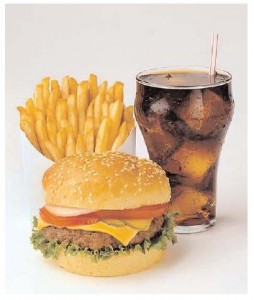
The trifecta represented: oxidized seed oils (fries), gluten (bun), high fructose corn syrup (soda).
Forgive my informality here, but, DUH! I can’t understand how someone would make any assumption otherwise. When you look at what kind of input a person is getting two, three, four, five, six, seven, eight or even more times every day, it’s a no-brainer that it’s going to have an impact on the health of our vascular system. Clearly these inputs can include other environmental factors like toxins (or more positive inputs like exercise) but food is something we put in MANY times a day and we can exact control over much of what we are eating.
“…most of us have almost unrestricted access to food.”
Clearly most of us never want for food that isn’t available. This is not to say that there aren’t plenty going hungry every day in this country and around the world, but to note that the problem facing most Americans with questions surrounding diet is not one of scarcity. When people say they don't want to give up a certain food, I remind them that it will ALWAYS be there later (though by that point they're healthier and have usually seen the light). Step away from the bagels.
“The era of myth and marketing is at last giving way to an era of hard fact.”
Amen to that. If it were really true, that is. The entire foundation upon which a Paleo or primal type of diet is based is science: evolutionary biology, looking to our ancestors and then to current scientific research on how food works in the body today to reach conclusions about what may promote health for most people. We can't rely on those selling us the food to educate us on why or how it’s healthy.
Sadly, even Dr. Oz is selling us processed foods, despite his best efforts to say otherwise in this article. Just watch his show for an hour and see which companies are filling his bank account. If he really wanted to take a stand for eating whole foods, he'd make a stand against processed food ads. This may be extreme and nearly impossible given the current markets and power of Big Food to pay for ad space, but I say anything is possible with enough conviction. Clearly Dr. Oz doesn't have it. Step away from the processed foods.
“Up is down. Want to get healthy? Then forget about diet soda and low-fat foods. Instead, tuck into some eggs, whole milk, fat, salt, nuts, wine, coffee and chocolate.”

Enjoy whole foods like butter and eggs. (Yes, the yolk, too.)
THANK YOU. Oz even goes so far as to say that “Despite conventional wisdom all of those foods and many more can be beneficial to your body.” He explains how some commonly demonized nutrients and foods have been shunned unnecessarily including salt, red wine, chocolate and full fat milk. Then he goes on to tell the reader that “the key, for all of these foods, is moderation.”
Yawn, we've heard all that before.
Oz begins to vindicate fat in our diet, but steers a bit off-course when he lumps canola oil in with olive oil for its health-promoting properties. If you’re simply talking about the molecular structure of the fats, perhaps this would be true, and it’s likely why Loren Cordain even included canola oil as part of a healthy Paleo diet in his original book (though I think he sees the problems with it currently).
But this doesn’t take food quality or production methods into account. It also doesn’t recognize that the polyunsaturated fatty acids (PUFAs) that are touted for health benefits in these plant oils are often oxidized (damaged) by not only the production methods to get them from seed/plant to bottle, but then from the bottle to your plate via refining, heating, light and air interactions with these delicate fatty acids. Step away from the seed oils.
“As a heart surgeon, I am continually struck by the variability in how people process dietary cholesterol.”
Clearly Dr. Oz hasn't read any of the work by Dr. Uffe Ravnskov or other leaders in the field of cholesterol research or he'd have learned that dietary cholesterol is not to blame for heart disease. [1],[2] Hey, doc, here's another HUGE point you're missing with regards to cholesterol in the bloodstream: cholesterol itself not the problem. Perhaps high levels of cholesterol are a sign that something else is wrong and the body is responding with protective factors, OR perhaps a person just needs to operate at some higher levels of cholesterol in their body.
Does high cholesterol mean a person is less healthy or more prone to heart disease or death? I don't think so. Neither does Chris Masterjohn. And in this report, we can see how Ravnskov shows that cholesterol can even be protective against such ails.[3]
“Most people have little issue with their blood-cholesterol levels after eating foods that are relatively high in cholesterol.”
This is another “DUH” point for me while reading the article as I answer questions about this topic often at my seminars and have researched it based on what Dr. Uffe Ravnskov writes about this in his books “The Cholesterol Myth,” “Ignore the Awkward: How the Cholesterol Myths are Kept Alive,” and “Fat and Cholesterol are Good for You.” Ravnskov explains that serum cholesterol levels are only minimally affected by dietary cholesterol as exemplified by trials he's conducted.
In his article, Dr. Oz points to the fact that a few people may struggle with even small amounts of dietary cholesterol. Perhaps Oz is referring to those who are genetically predisposed to poor LDL receptor function as in the case of Familial Hypercholesterolemia, according to Chris Masterjohn [listen here at 1 hour 15 min], though he doesn't mention this genetic disorder in the article, which leaves the reader wondering who “most people” might be and whether or not they are part of that group. Unless you're allergic, go out and buy some more eggs. And for the love of all that is holy, eat MORE THAN ONE OF THEM AT A TIME.
Where Dr. Oz gets it wrong in his article…
Dr. Oz aligns diets I think most would consider to be actual “fads” together with general lifestyle changes/choices that many of us maintain for years or even our entire lifetime when explaining diet confusion. He puts Atkins, South Beach and the Mediterranean diet along side the cabbage soup diet and the grapefruit diet claiming that they ALL dramatically limit our food choices and are therefore unsustainable in the long-term. Come on, Dr. Oz, some of those are legitimately going to help people to improve health, while others are pretty darn silly.[4] Dr. Oz even goes so far as to say that those who faithfully follow the Atkins diet begin “to suffer the bad breath of ketoacidosis, which occurs when glycogen stores are too low.”
At this point in the article, I actually BACKTRACKED and had to remind myself of who wrote it. I asked myself, “what BS nutritionist wrote this not knowing the difference between keTOSIS and ketoACIDOSIS?!” I was so appalled that I though, “surely Dr. Oz didn't write this.”
Ketosis is a natural state for the body to be in where it can utilize ketone bodies versus glucose as a fuel source. Dr. Mike Eades explains this utilization very well in his post on “Metabolism and ketosis“:
As the liver breaks down the fat to release its energy to power gluconeogenesis, the conversion of protein to sugar, it produces ketones as a byproduct. And what a byproduct they are. Ketones are basically water soluble (meaning they dissolve in blood) fats that are a source of energy for many tissues including the muscles, brain and heart. In fact, ketones act as a stand in for sugar in the brain. Although ketones can’t totally replace all the sugar required by the brain, they can replace a pretty good chunk of it. By reducing the body’s need for sugar, less protein is required, allowing the muscle mass (the protein reservoir) to last a lot longer before it is depleted. And ketones are the preferred fuel for the heart, making that organ operate at about 28 percent greater efficiency.
Ketoacidosis is when the naturally occurring metabolic state of ketosis described above goes awry and our liver begins to break down “fat and proteins in response to a perceived need for respiratory substrate to maintain it.” Sound scary? Perhaps, but it's most common in uncontrolled Type 1 Diabetics.
Are you an uncontrolled Type 1 Diabetic? No? Then chill out and learn the difference between these two metabolic states.
Spending some time in ketosis may prove to be a great way for your body to naturally and easily burn your own fat stores for energy. Imagine that? Burning your body's stored fat for energy… sounds like what most people are TRYING to accomplish when they eat-less and move-more… no?
I can see how calling the cabbage soup or grapefruit diet dramatically limiting, but if you take an honest look at what's being consumed on an Atkins, Mediterranean, South Beach or Paleo type of diet, the food choices are pretty endless. They are limiting in terms of what's available in the American food landscape, but that doesn't mean they're limiting, nor that the easily available “food” served in this country (yes, I'm focusing on the US since that's who Dr. Oz mainly is addressing) is even what people SHOULD be eating for the most part. This is why a legitimately different way of eating (grain-free, perhaps?) gets viewed as a “diet” by mainstream media, and those of us who educate on the topic are sort of forced to label it for any gravity in the realm of the health-conscious general public. Talk to anyone who eats “this way,” and most of us would never, ever call it a diet.
“Bad fats generally include saturated fats (found in animal products), trans fats (found in hydrogenated and partially hydrogenated oils) and their cousin cholesterol (found in egg yolks, meat and dairy products).”
Dr. Oz lumps naturally occurring fats from animal products with man-made hydrogenated, refined, industrialized seed oils. Well, clearly that's how Americans already think, so he's not helping anyone to uncover the truth about natural fats versus man-made fats. Oz goes on to exonerate the saturated fat in coconut oil explaining that “new research” says it may actually be good for you.
I’m not sure what he considers to be new research, but we’ve seen this information in studies for some time now.[5] I’m happy to see when people reverse their stance on something in light of new information (as Cordain has also done regarding saturated fat to an extent in his new version of The Paleo Diet as well as in his presentation at the Ancestral Health Symposium this past August). I will remind people, however, that it was just under two years ago when I read a question answered by Dr. Oz and Dr. Roizen about coconut oil stating quite adamantely that it was unhealthy. Argh. This one deserves a big, FAT: “WE TOLD YOU SO!”
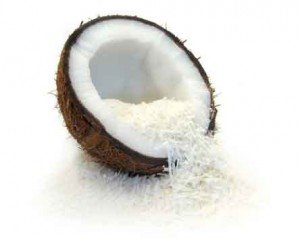
Oz also states that monounsaturated fatty acids (MUFAs) have been found to lower LDL and raise HDL. Okay, this may be true, but we’ve also seen that saturated fatty acids (SFAs) like those from coconut oil can raise HDL.[6] Interesting, no? Oz also states that simply lowering LDL and raising HDL will lower the risk of atherosclerosis and heart disease.
I think Chris Masterjohn, someone many consider to be a leading expert on cholesterol and its role in the health of humans,would beg to differ that simply manipulating the numbers on our blood tests will be the answer to a positive effect on our long-term health. (Listen to both of his recent podcast interviews with Chris Kresser here and here.) Rather, changing our diet and lifestyle to then, in turn, allow our cholesterol levels to reach a healthy place for what our bodies need, should be the approach we take. People want to think their health is easy to measure in numbers. Sadly, it's not quite that simple.
“Most physicians are now comfortably recommending one egg with the yolk per day as an inexpensive source of high-quality protein, even though a few patients do need to be pulled off the program pending blood-cholesterol levels.”
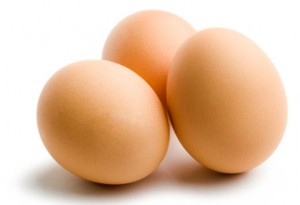 Who is this person? Is it a 105lb female? Is it a 195lb male? Is the person active or sedentary? How much food is this person eating over the course of the day? If the person is eating ONE EGG, say, for breakfast, what else is the person supposed to eat to gain satiety? I'd argue that most Americans then fill their breakfasts up with oatmeal, other cereal, fruit or yogurts that contain sweeteners. Sugar, sugar and more sugar. Ugh.
Who is this person? Is it a 105lb female? Is it a 195lb male? Is the person active or sedentary? How much food is this person eating over the course of the day? If the person is eating ONE EGG, say, for breakfast, what else is the person supposed to eat to gain satiety? I'd argue that most Americans then fill their breakfasts up with oatmeal, other cereal, fruit or yogurts that contain sweeteners. Sugar, sugar and more sugar. Ugh.
Beyond that, since the original scares around dietary cholesterol raising serum cholesterol, there have been multiple studies that say just the opposite, that the need to limit egg consumption is unfounded and that cholesterol level markers, in isolation (out of context, without knowing about the person's entire lifestyle) are not significant markers for developing heart disease. [7] Additionally, “Several recent studies have shed additional light on the specific interplay between dietary cholesterol and cardiovascular health risk. It is evident that the dynamics of cholesterol homeostasis, and of development of CHD, are extremely complex and multifactorial.
In summary, the earlier purported adverse relationship between dietary cholesterol and heart disease risk was likely largely over-exaggerated.” [8] This recommendation REEKS of the whole “everything in moderation” approach. Which I pretty much loathe. Why don't we EVER hear that people should moderate their intake of grains from anyone but Paleo or primal advocates?
“The only fat that is universally accepted as bad is trans fat, and that’s now been stripped out of most foods.”
Something Dr. Oz NEVER addresses is that the real issue we're still facing today regarding the consumption of “bad fats” is that, even with the supposed limitation of trans-fats in processed foods currently, the food supply is still LOADED with industrial, highly refined seed oils. Seed oils, as discussed earlier are not, for the most part natural and healthy foods for us to eat.
The oils to which I'm referring include everything from canola oil, corn oil, soybean oil and cottonseed oil (all refined by expeller and with a lengthy process, see the graphic to the right) to even grapeseed oil and some sesame and peanut oils (look for cold-pressed vs expeller pressed varieties for safer versions, though cooking with them is not recommended).
The refining process alone damages many of the delicate PUFAs within the seed oils, which is one of the reasons for the added step of deodorization in the process.
Furthermore, according to Sally Fallon and Mary Enig, “certain types of trans fatty acids could probably be formed from a highly polyunsaturated oil during deep fat frying in one of the new pressure cooker fryers, but these types of trans fats would be like those formed in high pressure deodorization.” [8] So we're damaging these oils by simply refining them, before they even get into our cupboards or into the processed foods that contain them, of which there are MANY. Even Muscle Milk contains canola oil. Yes, really. Step away from the Muscle Milk.
Furthermore, when we heat these oils we are risking damaging them since they are largely unsatuarted (mono or poly) and their chemical structures are weak relative to that of their sister fatty acids, saturated fats. When we consume damaged oils, we are exposing our bodies to oxidative damage and inflammation that we work so hard chugging blueberries to defend against! [9]
It’s frustrating that Dr. Oz is talking out of both sides of his mouth in this article.
I understand that he’s trying to dispel myths, but the problem is that he’s not explaining what the problems in the diet ARE as much as he’s trying to explain why some things we’ve thought were problematic may not be. This leaves the reader to believe that much of the Conventional Wisdom around what is a balanced and healthy diet is likely what they thought before: eat everything in moderation, though I propose that even the term moderation VARIES GREATLY from person to person. What does moderation even mean? And it seems that when people DO try to take the “everything in moderation” approach, they're left hungry, nervous, and unsure of what exactly they should be eating. I've seen this time and time again with my clients who are scared of fat and eating high-carb/low-fat diets only leading to anxiety around food choices because they just “don't know what's right.”
Dr. Oz, you haven't helped to clarify much of that at all for them with this article.
The apparent take-away from Dr. Oz’s advice in this article: Eat unprocessed foods primarily. GREAT. From there, moderate everything that mother nature provides that seems possibly like it might somehow have a negative effect on some people's health. It’s wishy-washy, nebulous and “conventional wisdom in a new outfit” advice if I've ever heard it. I wish he'd just be a bit more vocal on his TV show about how healthy a grain-free diet can be. Perhaps he needs to learn more about it and will come around. I'm trying to have faith that this doctor will learn and change his stance and it appears that he's more open to it then we may have thought…
Dr. Oz fields a question on his show about The Paleo Diet.
Interestingly, his advice on it is mostly accurate, but he's ignoring what we know about modern grain products and their effect on human health. Not to mention he is not well-versed in the diet or the facts on Paleo man, considering average life expectancy then includes higher infant mortality rates without modern medical interventions. Alas… watch the clip. He can't tell the viewers not to eat grain products at all or this show would be off the air due to lack of commercial funding.
Ask Dr. Oz Season 2: Post Op #21: MyFoxCHICAGO.com
And apparently just today Dr. Oz says that a ‘pre-historic diet' is the best way to decrease hypertension at ~19:30. “We are not designed to eat the modern food diet.”
Sources:
[1] Ravnskov, Uffe. A hypothesis out-of-date: The diet–heart idea. Journal of Clinical Epidemiology, Volume 55, Issue 11, November 2002, Pages 1057-1063. [2] McNamara, Donald J. Dietary cholesterol and atherosclerosis. Biochimica et Biophysica Acta (BBA) – Molecular and Cell Biology of Lipids, Volume 1529, Issues 1-3, 15 December 2000, Pages 310-320. [3] Ravnskov, Uffe. High cholesterol may protect against infections and atherosclerosis. QJM: An International Journal of Medicine, Volume 96, Issue12, 2003, Pages 927-934. [4] Frassetto, L A, et al. Metabolic and physiologic improvements from consuming a paleolithic, hunter-gatherer type diet. European Journal of Clinical Nutrition (2009) 63, 947–955; doi:10.1038/ejcn.2009.4; published online 11 February 2009 [5] Mensink, Ronald P., Peter L Zock, Arnold DM Kester and Martijn B Katan. Effects of dietary fatty acids and carbohydrates on the ratio of serum total to HDL cholesterol and on serum lipids and apolipoproteins: a meta-analysis of 60 controlled trials. American Journal of Clinical Nutrition, Vol. 77, No. 5, 1146-1155, May 2003 [6] Hayek, Y Ito, N Azrolan, R B Verdery, K Aalto-Setälä, A Walsh, and J L Breslow. Dietary fat increases high density lipoprotein (HDL) levels both by increasing the transport rates and decreasing the fractional catabolic rates of HDL cholesterol ester and apolipoprotein (Apo) A-I. Presentation of a new animal model and mechanistic studies in human Apo A-I transgenic and control mice. Laboratory of Biochemical Genetics and Metabolism, Rockefeller University, New York 10021-6399. J Clin Invest. 1993 April; 91(4): 1665–1671. [7] Constance, C. The good and the bad: what researchers have learned about dietary cholesterol, lipid management and cardiovascular disease risk since the Harvard Egg Study. International Journal of Clinical Practice, Special Issue: A Review of the Harvard Egg Study, Volume 63, Issue Supplement s163, pages 9–14, October 2009 [8] Jones, PJ. Dietary cholesterol and the risk of cardiovascular disease in patients: a review of the Harvard Egg Study and other data. Int J Clin Pract Suppl. 2009 Oct;(163):1-8, 28-36. [9] Enig, Mary. “Trans Fatty Acids Are Not Formed by Heating Vegetable Oils.” February 24 2004. [10] Masterjohn, Chris. “Corn Oil, Not “High-Fat,” Causes Inflammation.” January 13, 2010.More sources if you're interested:
Kritchevsky, Stephen B. PhD. A Review of Scientific Research and Recommendations Regarding Eggs. J Am Coll Nutr December 2004 vol. 23 no. suppl 6596S-600S.
McNamara, Donald J. The Impact of Egg Limitations on Coronary Heart Disease Risk: Do the Numbers Add Up? J Am Coll Nutr October 2000 vol. 19 no. suppl 5540S-548S.

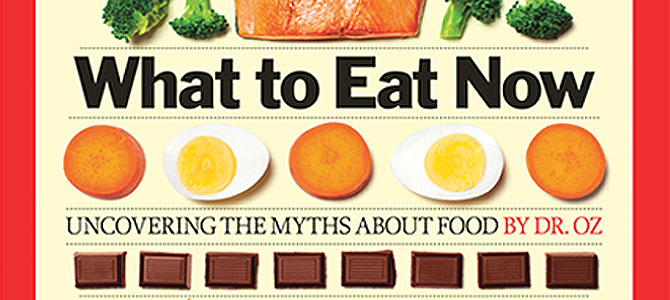
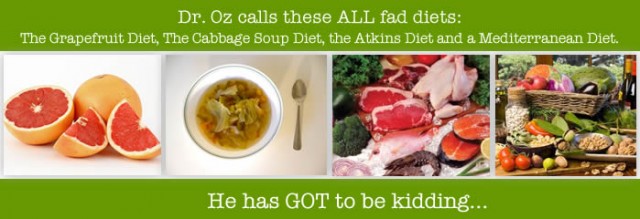
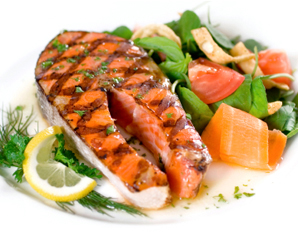
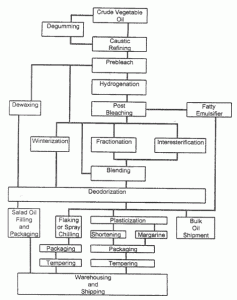
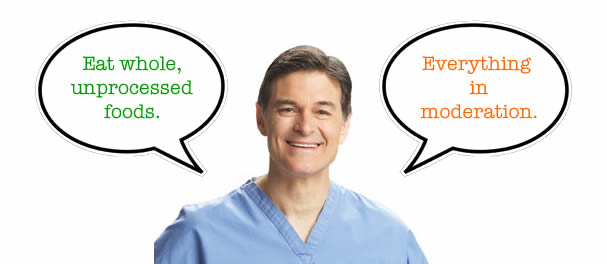
Comments 50
I didn’t see that new soundbite coming. “pre-historic diet’ is the best way to decrease hypertension”, “We are not designed to eat the modern food diet.”
Now if he would call attention to it on HIS show.
Right?! I think he can say that on shows other than his own more easily without the advertisers “watching.”
Thanks for this, Diane. Someone has to call Dr. Oz out on all this flip-flopping, inconsistent madness.
I think he’s stuck. I think he’s beginning to see the error of his previous messages (and as you so generously remind us all, we all used think differently about this stuff), but you’re right, he has advertisers to keep happy. It reminds me of the White House’s new campaign, and they do push real foods, but they can’t upset any of the major food lobbies by stating anything too strongly.
It must be difficult for him to process and acknowledge that he’s been wrong all these years and that his advice may have been contributing to the damage he tries to fix in his patients.
It happens to the best of them. Heck, it happened to Cordain on the topic of saturated fat 😉
Diane, This is a GREAT piece of work on nutrition and I really like the way you take apart Dr. Oz’s “proclamations” point by point. Very well researched. Thanks,
Sylvia
Karen P. I think you are dead on about Dr. Oz being stuck. He has changed. How could he not? He has had some of the best, most current guests on his show recently and they have influenced his thinking. He showed a picture of the inside of his fridge recently and it was a real eye-opener for me. I saw that the good doctor and his family were eating a “mostly prehistoric” diet. No juice–water only. He also has his family off of processed sugar. And the oil he uses is olive oil, not canola. For the most part the fridge could have been Diane’s except I think someone in that family eats sprouted bread.
And instead of saying that he has been wrong all of these years, he says things like, “Maybe we have gotten this wrong!”
Holy epic post, Diane. Hope between yours, Robbs and his recent comments maybe he’ll get some real knowledge on his show to spread the whole food word!
Do you think maybe he meant that long-term ketosis will lead to ketoacidosis? Like, it’s inevitable that one cannot live in ketosis/low-carb for a lifetime?
The best thing I ever learned from Dr. Oz was how my poop should look. Ironic… the food he tells me I should eat does NOT make it look the way he says it should!
Yikes people! We have the greatest avenues to good health in our time and of the age. Let’s be grateful. Dr. Oz, must “flip flop” because nutritional science is constantly changing.
“Healthy whole grain”, like healthy low tar filtered cigarettes? It is just not as bad. But that is not saying it is good for you! 😀
Diane,
This is a great post. A coworker just stopped me in the hall this morning and thought it was great I lost 45lbs in 6 months by just changing my food intake and no exercise. Not the healthiest, but it got results. She went on to boast how she loves Dr. Oz. I was a little taken back because I used to love his suggestions especially when I would hear twinkles of knowledge thrown in. But the last year he is seeming more flip floppy and it’s really grating on my nerves. I basically told my coworker what you wrote, the abridged version. :o) Thanks for putting this together.
Thank you for this article. My husband and I picked up the same mag on a recent trip as well. What I find most frustrating is when you set friends and family straight and then they watch Dr. Oz or The Doctors and think somehow because they are doctors they are nutrition experts.
You made some good and funny points but there are a few misleading and incorrect statements that you made i.e in reference to this statement;
‘Oz also states that monounsaturated fatty acids (MUFAs) have been found to lower LDL and raise HDL. Okay, this may be true, but we’ve also seen that saturated fatty acids (SFAs) like those from coconut oil can raise HDL.[6] Interesting, no?’
Coconut oil is NOT a long chain, its a medium chain and that is why it lowers LDL.
How can you think Atkins is NOT a fad diet? It is extreme and unhealthy. Atkins himself suffered a heart attack in 2002, before his death in 2003 and he had CHF and high blood pressure. That’s what you’ll get when you can eat unlimited red meat, bacon & cheese which is why the ‘New” Atkins books don’t say that anymore.
Coconut oil is a medium chain, yes- medium chain and saturated fats are not mutually exclusive. I did not mis-speak there. You’re confusing MUFA with MCT it seems…
I can think whatever I want, right? Well, I don’t think Atkins is a fad diet. I used to think that when I didn’t know what it was all about. Perhaps if you still believe that a proper Atkins diet is all red meat, bacon and cheese then you should consider becoming more educated on what that diet includes to make an appropriate commentary on it. Until then, my opinion of it as not being a fad stands.
@k,
I guess that the terms of your PETA or CSPI membership won’t actually let you read an Atkins book and I am sure you are required to spread the myth of the diet and how he died. Why would you want to clutter your brain up with fact when you have such a vivid grasp on the fiction?
His death certificate states that the cause of death was “blunt impact injury of head with epidural hematoma”.
http://lowcarbdiets.about.com/od/atkinsdiet/a/dratkinsdeath.htm
If you actually read the book it promotes whole foods, including meats and lots vegetables and exercise, but you still want to parrot this tired old garbage about how unhealthy it is.
The “promoting of whole foods and lots of vegetables and exercise” started after his death. His first book which was published in 1972 with MANY revisions published after that did NOT promote those things. It was not until his death and the all the critisim from the medical community that were those suggestions were added. Atkins himself had nothing to do with those newer additions.
Again, I never said he died of a heart attack. He had a heart attack in 2002 and he died in 2003.
Atkins developed cardiomyopathy from a VIRUS in 2000, diets don’t cause viral attacks.
He slipped and fell on ice in 2003 was in the hospital for a while and gained a ton of weight off of the “healthy” hospital food and died obese but was NOT obese when he went into the hospital.
Jesus, the Atkins libel is ridiculous…
JoshS & Stephanie O
I am NOT talking about his death in 2003. He had a heart attack in 2002 and I NEVER said he was obese. Re-read my post.
Dr. Atkin’s medical records were released (mistakenly) to the Physician’s Committee for Responsible Medicine and his medical records state that he had a heart attack in 2002, HTN and CHF. These were all conditions diagnosed PRIOR to his death.
Diane,
Thanks for this article. And thanks for the sources! I have recently returned to school to study nursing and have to take a basic nutrition course. The instructor is a 20 something Type I diabetic who seems to be sponsored by the corn or wheat lobby. Just today she told me that coconut oil is bad for me. But she couldn’t explain how seed oils make me sick when I consume them. She also doesn’t understand how I can get enough fiber without eating whole grains.
She sounds pretty clueless. Bring her Robb’s book, The Paleo Solution. Tell her when she’s done reading it you’ll treat her to lunch and have a conversation 😉
Thanks, Diane. I appreciate your posts immensely.
I am wondering if there is any differential between Oz’s public statements
and what he personally practices…
I bet there is some difference, but probably not much.
Great Article, I guess there is not chance Dr. Oz will invite Dr. Davis (Wheat Belly) to be a guest on his show. Interesting that both doctors have a common background as heart surgeons.
What an amazing article Diane! I decided to come read the post after hearing you talk about it on one of the podcasts. It’s a great article to share with folks. Thanks.
I really like this article. Actually, cardiologist Dwight Lundell gets the nutrition part correct in his book, The Great Cholesterol Lie. He suggests grass fed protein, good fats and organic fruits and veggies. He says to stay away from the grains and sugar.
Finally read it. Awesome. I went back a number of times to get the full quote from Dr. Oz that is:
“Do you know what I’m doing actually as part of the show. I’m thinking about doing it to you. We’re putting a bunch of yours in a zoo. And were gonna feeding them what prehistoric man ate. Cuz it is one of the most effective ways of reducing blood pressure. We are not designed to eat the modern food diet.”
I think you are completely out of touch with what most Americans are willing to do. Dr. Oz is trying to make the people who eat cheetos and drink sodas all day a LITTLE healthier. I don’t think he is correct 100% of the time, but I dont think you fully grasp what he is up against. He is the popular nutrition guru and is trying to do the best he can by putting together information from all directions. The front lines are not pretty. Give him a little bit of a break.
Sure, he is in bed with some of the food companies, but he needs to ease people in slowly. Being so extreme will never change those super unhealthy people. I think its really easy to get into a community where everyone thinks alike and forget there are thousands of people out there who don’t even eat 1 vegetable a day, much less make 1/2 (or more) of their plate vegetables. Most of the people that I know think Paleo is insane and would NEVER consider doing it. Keep that in mind.
I actually did commend him for the parts of his article that were accurate, did you miss all of that section of my post?
“He is the popular nutrition guru and is trying to do the best he can by putting together information from all directions.”
To me, this is not an excuse for perpetuating crappy information and not doing the real research to set the record straight as a responsible doctor.
I realize that most people think Paleo is crazy, that doesn’t mean I have to retreat and not hold my own ground in educating people on what I believe is a healthy way of life. This is my blog, after all. If we continue to assume people will NEVER consider doing it, well then, we are not giving people any credit. I think people do want to feel better, for the most part, and a lot of them would give something shot if they learn that they could regain health. More people have NO CLUE that giving up “healthy whole grains” and embracing healthy animal fats like butter might lead to vastly improved health than the number who currently might have learned of this way of life and dismiss it as “crazy.”
I’m aware that the front lines are not pretty. I consider it job security. There are a ton of people out there for me to help, and that’s not ending anytime soon.
Oh wow!!! I totally agree with your statement that “this is not an excuse for perpetuating crappy information and not doing the real research to set the record straight as a responsible doctor”. I have been thinking this for a long time now about him and others that promote a healthy life style without research behind their statements. I say, grow a consience and stand behind what you preach. Honestly is the best policy. Greed is a very incidious dis-ease and most of the time overrides our conscience. Just my opinion.
I am very new to all of this but share many of your thoughts and will be reading your blog for the journey I have embarked on. I am 57 years old and finally got sober enough to put one foot in front of the other. I have known this way of eating is the right way for years, but not until now am I ready to take this journey and commit to it. I am starting with the paleo diet plus and implementing the leptin reset protocol.
I admire you for helping people by the use of the internet. I will be here often taking in all the knowledge I can from your experiences. That I thank you for.
Thanks, Susan- and welcome!
AJ, couldn’t agree with you more. It’s easy to get on a high horse and preach about only a single diet being right. The reality is there are millions of people with a lack of education on what foods they should be eating, millions of people that have little to no access to fresh foods, and millions of people that cannot afford to be eating grass fed beef and coconut oil. Give praise where it’s due. Dr. Oz, through his mainstream show, has been able to reach these individuals. It may not be perfect, but it’s certainly a big step in the right direction.
Great article, Diane! Helpful and informing as always!
Just wanna point out that not everyone has a heart attack from eating crap and not exercising.
My neighbour (before his heart attack) grow most of his own food (including meat and eggs) and his job was to walk up and down paddocks, weeding and picking produce.
So theres another point where he wasnt quite right, not everyone has a heart attack due to life style
It is really encouraging to see nutrition discussed as you are doing. It is too complex to learn from TV or newspapers & magazines. To be nutritionally savvy you have to educate yourself. Unless curicula have changed, nutrition is not being taught in medical schools. A final point is that we are biochemically unique and it is useful to have a way of testing one’s self for various foods, because this fluctuates. If all this helps people be more aware of growing their own food, even in small amounts, and responding to seasonal and local changes, even better. Keep up the good work. PZ Hummel
I understand what Dr Oz is doing. He is gently leading the people to eat healthy, not throw them in the cold water of paleo diet which may shock many despite how easy it may have been for you, me or the paleo joe next door. Not very body can be like most of us who leave with little to no effort in the hands of healthy wholesome eating style. There are many things to consider; for one, yes the tv station and the supporters of the show must be satisfied so Dr Oz has a difficult stance when he speaks, if you read between the lines, he will talk about grains then give hints to gluten free eatig plan.
Most of the peoople he has helped ate well beyond their turn, eothetoo old or dead set in their ways, therefore even of they cut a minimal amount of badness from their diet can be significant at this point.
And last, if he just talked about paleo diet on tv eventually he would run out of talking about things. He tries do hard to appeal to many different persons gives and his main goal is their well being. He must consider where these people stand, not expect them to jump carb ship like the rest of us diet benders but ease into it and even hvw a chance to find their way into it. After all u were not spoon fed your decisions. So shouldn’t they. In addition, if you believe he is not doing well, get offline and get your own tv show. That’s an idea huh?
I understand what Dr Oz is doing. He is gently leading the people to eat healthy, not throw them in the cold water of paleo diet which may shock many despite how easy it may have been for you, me or the paleo joe next door. Not very body can be like most of us who leave with little to no effort in the hands of healthy wholesome eating style. There are many things to consider; for one, yes the tv station and the supporters of the show must be satisfied so Dr Oz has a difficult stance when he speaks, if you read between the lines, he will talk about grains then give hints to gluten free eatig plan.
Most of the peoople he has helped ate well beyond their turn, eothetoo old or dead set in their ways, therefore even of they cut a minimal amount of badness from their diet can be significant at this point.
And last, if he just talked about paleo diet on tv eventually he would run out of talking about things. He tries do hard to appeal to many different persons gives and his main goal is their well being. He must consider where these people stand, not expect them to jump carb ship like the rest of us diet benders but ease into it and even hvw a chance to find their way into it. After all u were not spoon fed your decisions. So shouldn’t they. In addition, if you believe he is not doing well, get offline and get your own tv show. That’s an idea huh?
Thanks, I’m not interested in being on TV, however. That said, I think I did paint Dr. Oz’s stance fairly: I pointed out where he was getting it right as well as wrong. I didn’t say he’s full of hot air, but I did say to trust him in moderation…
And I understand how it works with advertising and mass appeal… and with teaching people to make some small changes that make big positive impacts on health. That wasn’t the point of the post.
Thanks for the informative material on Dr. Oz and his fundamental views on medical well being. As a fellow physician I must say that this doctor is a joke. He endorses methods that any doctor will never encourage. Yes, Dr. Oz has credentials to his name but the views he represents on television is nothing more than humiliation on the medical community.
Well, I got here looking for something else, and I’m going to add my 2-cents.
The most amazing and joyous way to eat is Genesis 1:29: fruit and leafy greens. Even gourmet raw vegan is so much better *and kinder* than the diet called paleo. And gives even grandmothers incredible joy and stamina and health.
And so many of these poor animals are fed genetiacally modified alfalfa.
Would seem that the earliest diet must have been fruit and greens for it is so simple and gentle.
What is it, this passion for eating other sentient beings?
What about Genesis 9:3 – Every moving animal that is alive may serve as food for YOU. As in the case of green vegetation, I do give it all to YOU. 4 Only flesh with its soul—its blood—YOU must not eat.
I believe there was a reason we were told to eat animals after the earth suffered a cataclysm. I wont go so far as to say it isn’t possible to get all we need without animal products (science seems to say so, but how big a deal it actually is isn’t actually clear from what I can see), but it is certainly very difficult, and was actually impossible in most of the world before modern transportation.
I want to add that I was a student of animal behavior and psychology in college. My goal was and still is to advocate for animals. I have always believed that the gap between human and animals was huge and that human lives have much more value than animals. Now after studying all the scientific data on animal psychology I am convinced of it. They are a gift to us for us to use but not abuse.
I agree that the general perception of saturated fats and cholesterol in relation to heart disease may be wrong but advertising saturated fats to everybody as the only healthy fat can carry risks too. Large (14% of population) group of Apo E4 respond to died high in saturated fat with sky high cholesterol numbers (LDL 250+) and these may represent risks that have not been researched so far.
I appreciate the article. I too am sick to death of hearing friends and family believing and following Dr. Oz’s incomplete or outright wrong advice esp. regarding diet.
I do take issue with the idea that food is the biggest reason people land on the operating table. There is no scientific evidence given to back it up, because there is none. It’s true that no one with any sense would deny that what we eat has an effect on our health. But these days people take it way too far. So many other things are involved including genetics but WAY under emphasized is the effects of stress. In fact I’m convinced after reading much research that it is the biggest facter in the rise in disease in the U.S. Our bodies have been wonderfully designed to process foods, keeping whats useful and expelling what isnt. It doesn’t do it perfectly and chronic intake of harmful substances can have an effect on health, sure, but not to the extent many would have us believe. The liver and kidneys usually do an exellent job keeping us from the effects of toxins. It’s an amazing system that when working correctly offers much, but not always complete, protection. I have jumped on the organic, locally grown, grass fed bandwagon and I have tauted the evils of soft drinks (diet and regular) I eat eggs regularly and have been working to include more and more lean protein and healthy fats in my diet. So, obviously I do believe that diet is important in health. But it’s just that people take it too far in my opinion. Yes, let’s tell people that it’s important to eat healthy, but let’s not go beyond science and claim food is the main cause of disease.
Hello would you mind letting me know which web host you’re using? I’ve loaded your blog
in 3 different internet browsers and I must say this blog loads a lot quicker then most.
Can you recommend a good internet hosting provider at a reasonable price?
Many thanks, I appreciate it!
I’m on MediaTemple now.
What kills me about Oz (the great and powerful) is that he is not just a sell-out; we see that every day all around us. Doctors enjoy a special relationship with the public; they give professional advice in an atmosphere of trust. He, however, has parlayed his credentials and exposure on pop shows to create an empire built on entertaining at the expense of legitimate medical science. And of all people, it is the cardiologist and heart surgeon who we hope will keep an open mind about the root cause of diseases of civilization. He should be exploring the facts behind heart disease and avenues of prevention and treatment, including well-researched nutritional programs. The difference between Oz and an actor wearing a stethoscope and white coat hawking the latest and greatest, is that Oz, being a doctor, has in the process sold out his profession and patients everywhere.
What kills me about Oz (the great and powerful) is that he is not just a sell-out; we see that every day all around us. Doctors enjoy a special relationship with the public; they give professional advice in an atmosphere of trust. He, however, has parlayed his credentials and exposure on pop shows to create an empire built on entertaining at the expense of legitimate medical science. And of all people, it is the cardiologist and heart surgeon who we hope will keep an open mind about the root cause of diseases of civilization. He should be exploring the facts behind heart disease and avenues of prevention and treatment, including well-researched nutritional programs. The difference between Oz and an actor wearing a stethoscope and white coat hawking the latest and greatest, is that Oz, being a doctor, has in the process sold out his profession and patients everywhere.
The biggest benefit to Dr. Oz is that he has made one of the most boring and difficult to understand subjects interesting and almost exciting. His show is mostly aimed at nutritional newbies and of course fast-food America so I’m ok with most of the liberties he takes. Of course we need to consult multiple sources for our knowledge, but hey, his show is more than just a great start on our road to good health.
Pingback: Paleo & Calcium - Steve’s PaleoGoods